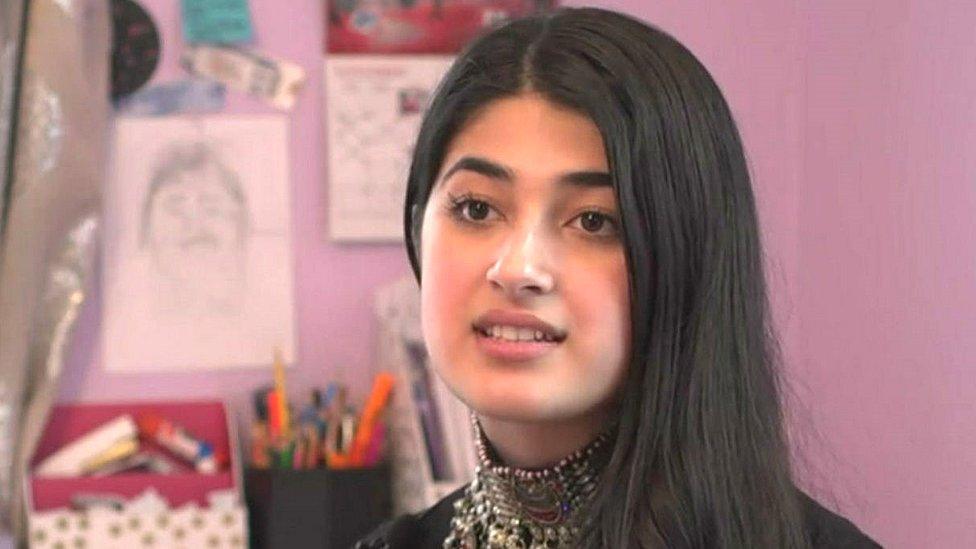Tech Tent: Tik Tok and the Uighur Muslims
- Published

Feroza Aziz: "I thought that this isn't right and I need to spread awareness"
It is a place where a mostly teenage audience goes to mime to music, share memes and generally have a laugh.
But on the Tech Tent podcast this week, we find out how TikTok got immersed in a deadly serious row about censorship.

It was Sunday evening when 17-year-old Feroza Aziz posted a video on her TikTok account.
It appeared at first to be a guide to curling your eyelashes. But after a few seconds, she put down the eyelash curler and urged viewers to search out information about China's mistreatment of Uighur Muslims.
Speaking to the BBC, she explained why she felt compelled to act.
"As a Muslim, I've always faced oppression and racism. But to see that these group of people, this ethnic group is going through much more than I could ever imagine, I thought that this isn't right and I need to spread awareness about this," she said.
Her denunciation of what she described as "another holocaust" seemed designed to provoke TikTok's Chinese owner Bytedance, testing its claims that outside China it does not censor political content.
Indeed, in a follow-up video she explained that she started her video chatting about eyelashes as a way of slipping past the moderators.
Account suspended
As the video went viral, both on TikTok and other platforms, the social media world waited for Bytedance to act.
But at first nothing happened and the video stayed up.
Then, says Feroza, she woke up on Monday morning to find her account was suspended, meaning she could not post any new videos.
By Tuesday, facing a growing storm, Bytedance was briefing journalists - including the BBC - that the suspension of the account was nothing to do with Feroza's activism on behalf of the Uighurs.
Instead, it was because 10 days earlier she had posted a video featuring Osama Bin Laden, infringing TikTok's rules on terrorism.
On the face of it, this sounded serious.
But then it emerged that the video in question was a jokey piece about the assumptions people made about the boys Feroza might date, ending with a one-second photo of Bin Laden.
Feroza explained that as a Muslim growing up in America she had been ridiculed, called a terrorist and "Bin Laden's wife", and she had decided to respond with humour.
Her first account had been taken down because of the satirical video, so she had started a new account.
"I made multiple posts on it and nothing happened. Right when I posted about the Uighurs in China, my account was suspended."
Suspicion of Chinese companies
Despite her suspension, the video continued to attract views and the row seemed to be dying down - until early on Thursday when it disappeared for just under an hour.
Bytedance blamed this on human error by a moderator and once again stressed that it did not censor political content.
"It's important to clarify that nothing in our community guidelines precludes content such as this video, and it should not have been removed," the company said.
While China has a number of extremely successful and popular social media services, TikTok is the first to make much of an impact outside Asia.
It was after Bytedance paid $1bn (£770m) for the Musical.ly video app in 2017 that its ambitions to become a force in the United States and Europe became clear.
But since then, suspicion of Chinese companies - particularly in the United States - has hardened. Now, politicians are asking whether that sale should ever have been allowed to proceed.
TikTok is growing rapidly and earning very respectable revenues. In recent months, it has been on a hiring spree, taking on a number of seasoned public relations professionals.
Now that activists have spotted what a useful platform the video site can be for messages of dissent against the Chinese government, that PR team can expect to be kept very busy.
- Published28 November 2019

